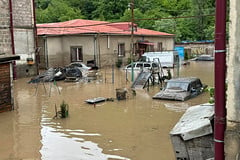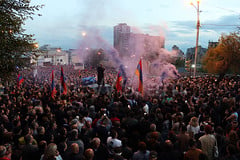
A compromise on the EU ceiling price for natural gas has still not been reached because of deep disagreements among member states over the impact of such a measure, Politico wrote.
EU ministers arrived in Brussels for an emergency meeting of the Energy Council to resolve the issue. Arriving at Tuesday’s meeting, EU Energy Commissioner Kadri Simson sounded downbeat about the prospects for a deal, calling it “probably the most challenging” Energy Council yet.
The price cap proposal pits a group of five skeptical countries -- Germany, Austria, the Netherlands, Denmark and Hungary -- against about 16 that support the idea.
Nevertheless, a group of ministers from both opposing camps, gathered at the Council building before the official meeting, began discussing their positions in an attempt to avoid sending the proposal back to EU leaders - something countries have been told to avoid. The leaders are meeting at a Council summit on Thursday.
“We will at least aim for broad agreement on technical parameters and as we all know there are still very different views around the table, so at first we need to see if ministers do have the willingness for compromises,” Simson said.
Under the Commission's original plan, the cap would come into effect when prices at the Dutch TTF hub reach 275 euros per megawatt hour within two weeks if those prices are more than 58 euros per MWh higher than the world market price of liquefied natural gas. This proposed cap is so high that it would not have been activated even during the August price spike, when prices briefly reached 350 euros per MWh, causing outrage among countries that support the cap.
The Czech Republic has proposed several amendments to the Commission's proposal.
The latest compromise calls for the cap to be activated if gas prices reach between 200 and 220 euros per megawatt hour. The price and number of days are in parentheses, which means the ranges in question need to be negotiated.
“I am viewing this meeting today with a bit of skepticism because there has been too little movement in the last days,” she added.
Kostas Skrekas, energy minister of Greece — which has been among the biggest proponents of a price cap — said: “The time for consultation has run out ... European citizens are struggling … and Europe is debating in vain. All of us must take our responsibilities and agree without delay.”
Czech Industry Minister Jozef Síkela said the latest text now on the table was a “feasible proposal” that addressed the concerns of countries on both sides of the divide. “Citizens and businesses expect from us that we will come up with a clear solution,” he said on arrival at Tuesday’s meeting. “Now this is purely on the ministers to show if they are ready to reach an agreement or not.”






















